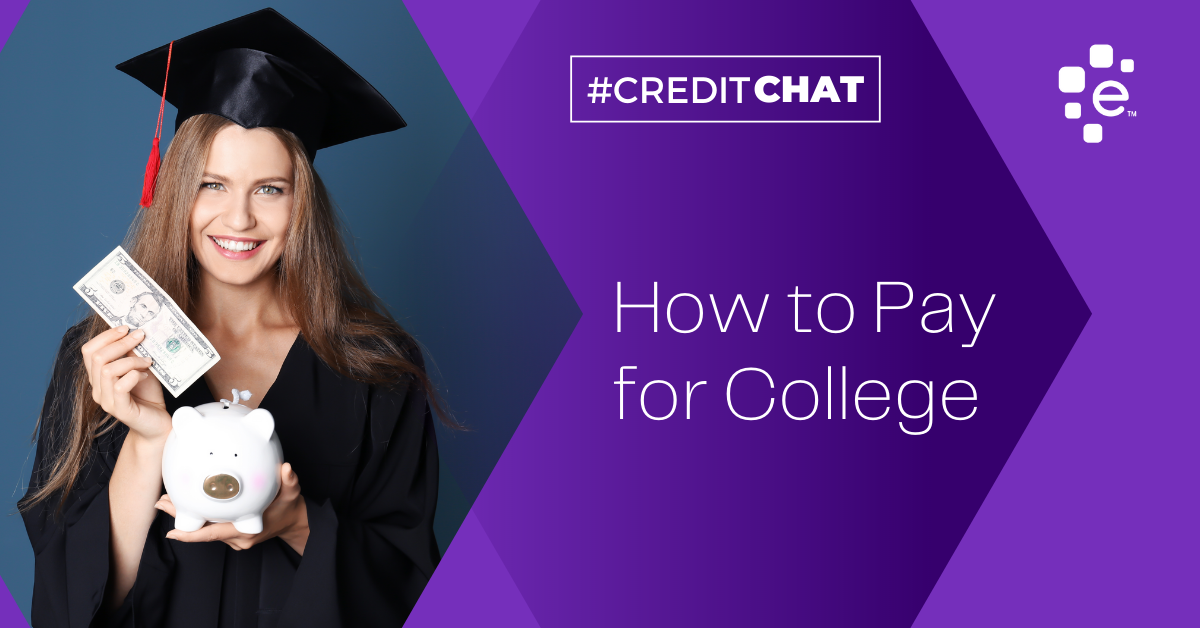How to Pay for College

Join our #CreditChat on Twitter every Wednesday at 3 p.m. ET.
The panel included Rod Griffin: Senior Director, Consumer Education and Advocacy, Experian; Christina Roman: Consumer Education and Advocacy Manager at Experian; Beverly Harzog: Credit Card Expert and Consumer Finance Analyst for U.S. News; Paulina Likos: Investing Reporter at U.S. News; Alicia R. Hudnett Reiss: CERTIFIED FINANCIAL PLANNER™; Take Charge America; Lawrence D. Sprung: CFP® President of Mitlin Financial, Inc; and Leslie H. Tayne, Esq: Founder and Managing Director of Tayne Law Group, P.C. (f/k/a The Law Offices of Leslie H. Tayne, P.C.).
Questions We Discussed:
Q1: What are some ways to pay for college without loans?
Q2: What are some common myths about financial aid?
Q3: What are some things to consider before taking out a student loan?
Q4: What is the difference between subsidized and unsubsidized student loans?
Q5: How can borrowers prepare to pay their loans back after graduation?
Q6: What happens if you default on a student loan?
Q7: How can borrowers avoid falling behind on student loan payments?
Q8: Is refinancing student loans a good idea?
Q9: How can borrowers determine if they’re eligible for loan forgiveness?
Q10: Where can students and their families learn more about college financial planning and other resources?
Retweet these insights from our community:
A1: Tips from @USNewsEducation for reducing college expenses. One way is to go to a community college for 2 years to save money. Then transfer to a university to take your major courses. #CreditChat https://t.co/whZ9wd7h6q
— Beverly Harzog (@BeverlyHarzog) September 16, 2020
A2: Myth: I don’t have good credit, so I can’t get a student loan.
Fact: There are federal student loans that don’t require you to pull your credit #CreditChat
— Paulina Likos (@Paulina_Likos) September 16, 2020
A3: Go for federal loans before you apply for private loans. Understand interest and fees you have to pay. Think about how much you’ll make in your first job in your chosen career. Guideline: Your loans should not exceed your estimated first year’s salary. #CreditChat
— Beverly Harzog (@BeverlyHarzog) September 16, 2020
A4(a). A subsidized loan will have the interest paid on the loan by the education department while you are enrolled, at least half time, in college. #CreditChat
— Larry Sprung, CFP® (@Lawrence_Sprung) September 16, 2020
A4(b). An unsubsidized loan will begin to accrue interest right away, including while you are enrolled at school. The unsubsized loan will be growing while you are at school and the debt will be larger when you graduate.#CreditChat
— Larry Sprung, CFP® (@Lawrence_Sprung) September 16, 2020
A5a. Borrowers with federal student loans get a 6-month grace period after graduation before payments are due. Use this time to set aside money to start making payments. Also be sure to research different repayment options to find the one that works with their budget. #creditchat
— Take Charge America (@TCAsolutions) September 16, 2020
A6: If you default on your student loan, your credit score will take a significant hit. Also, your wages may be garnished, and you could start getting calls from debt collectors. #CreditChat pic.twitter.com/19IMAXiuxp
— American Consumer Credit Counseling (@ACCC_TalkCents) September 16, 2020
A7. If you think you may not be able to make a payment on time, contact your lender ASAP – before you become delinquent. Federal student loans have different payment options that may be available to you, as well as possible deferment or forbearance. #CreditChat
— Jennifer White (@Jennifer_Wwhite) September 16, 2020
A8: Don’t make a quick decision based on interest rates. Educate yourself about what you can gain–and what benefits you will lose with your federal loans. From @StudentLoanHero: Questions to answer before you refinance. #CreditChat https://t.co/dvQJJAviKI
— Beverly Harzog (@BeverlyHarzog) September 16, 2020
A9. The most common form of loan forgiveness is under the PSLF. You can learn more about this at https://t.co/21Nt33zYeM to see if you qualify. They also discuss other information for student loan borrowers that could be helpful, especially during the pandemic.#CreditChat https://t.co/nVvGKTvgvh
— Larry Sprung, CFP® (@Lawrence_Sprung) September 16, 2020
A10: https://t.co/UrFuqD8ZgH is a great resource for college financial prep. Your credit union/ bank may offer no-cost resources, and the financial aid office at school will likely know the ins-and-outs, as well! #CreditChat
— Leslie H. Tayne, Esq (@LeslieHTayneEsq) September 16, 2020